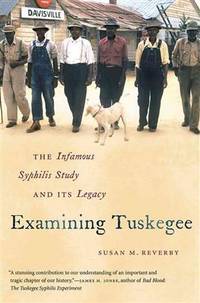
Stock Photo: Cover May Be Different
Examining Tuskegee: The Infamous Syphilis Study and Its Legacy Paperback - 2013
by Reverby, Susan M
- New
- Paperback
Description
New
NZ$90.54
NZ$21.14
Shipping to USA
Standard delivery: 14 to 21 days
More Shipping Options
Standard delivery: 14 to 21 days
Ships from Revaluation Books (Devon, United Kingdom)
Details
- Title Examining Tuskegee: The Infamous Syphilis Study and Its Legacy
- Author Reverby, Susan M
- Binding Paperback
- Edition Reprint
- Condition New
- Pages 416
- Volumes 1
- Language ENG
- Publisher Univ of North Carolina Pr, Chapel Hill, NC
- Date 2013
- Illustrated Yes
- Features Bibliography, Illustrated, Index, Table of Contents
- Bookseller's Inventory # x-146960972X
- ISBN 9781469609720 / 146960972X
- Weight 1.4 lbs (0.64 kg)
- Dimensions 9.1 x 6.1 x 1.1 in (23.11 x 15.49 x 2.79 cm)
-
Themes
- Chronological Period: 20th Century
- Cultural Region: Southeast U.S.
- Cultural Region: South
- Ethnic Orientation: African American
- Geographic Orientation: Alabama
- Topical: Black History
- Dewey Decimal Code 174.280
About Revaluation Books Devon, United Kingdom
Biblio member since 2020
General bookseller of both fiction and non-fiction.
From the jacket flap
The forty-year Tuskegee Syphilis Study, which took place in and around Tuskegee, Alabama, from the 1930s through the 1970s, has become a profound metaphor for medical racism, government malfeasance, and physician arrogance. Susan M. Reverby's Examining Tuskegee is a comprehensive analysis of the notorious study of untreated syphilis among African American men, who were told by U.S. Public Health Service doctors that they were being treated, not just watched, for their late-stage syphilis. With rigorous clarity, Reverby investigates the study and its aftermath from multiple perspectives and illuminates the reasons for its continued power and resonance in our collective memory.
